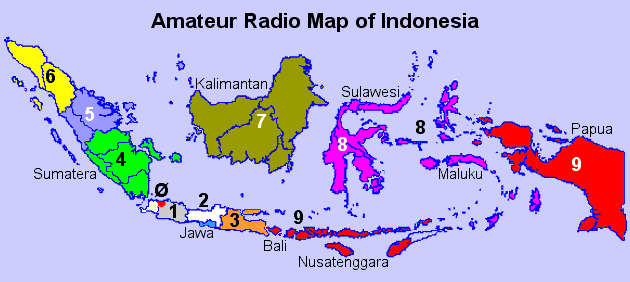| Amateur Service is a radiocommunication service for the purpose of self-training, intercommunication and technical investigations carried out by amateurs, that is, by duly authorized persons interested in radio technique solely with a personal aim and without pecuniary interest. (ITU Radio Regulations, Article S1.56) |
| Operation of an amateur radio station requires an Radio Amateur License issued by Directorate General of Posts and Telecommunications. There are four license levels, or "license classes" : No Code, Novice, General and Advanced. Before receiving a license, you must pass an examination organized by the state institution above. |
| A unique callsign is assigned to each amateur radio station during the processing of its license. Each amateur callsign has a two letters prefix (YB, YC, YD, YE, YF, YG or YH) indicating the station class and a numeral (0 to 9) named call-area indicating the geographic region of Indonesia, followed by a one to three letters suffix (in several call-areas indicating the province area). |
| Organisasi Amatir Radio Indonesia (ORARI) is an organization to represent the amateur service and its activities throughout the country, founded on July 9, 1968. ORARI subdivided into 3 levels of organization : ORARI Pusat (National), ORARI Daerah (Provincial) and ORARI Lokal (District). ORARI is a member of The International Amateur Radio Union (IARU). For more information, please contact ORARI Daerah Headquarters in your area. |
| Foreign amateur who wish to obtain license in Indonesia should have a temporary residence or residence permit in Indonesia and a reciprocal agreement has been established by the two countries. License class and privileges will be issued based on original license possessed and valid for only 1 (one) year. Guest Operator is permitted. For further information, please contact ORARI National Headquarters. |
| Class | Prefix | Privileges |
|---|---|---|
| No Code (Pemula) | YH | |
| Novice (Siaga) | YD, YG | |
| General (Penggalang) | YC, YF | |
| Advanced (Penegak) | YB, YE |
| * WARC bands : | New frequency allocations for amateur radio (30m, 17m and 12m) based on 1979 World Administrative Radio Conference. |
 |
| Operation of an amateur radio station requires an amateur operator license issued by Directorate General of Post and Telecommunications. There are four classes of license: No Code, Novice, General and Advanced, each authorizing privileges corresponding to the qualifications required. Before receiving a license, you must pass an examination organized by the state institution above. Most new amateur operators start with the Novice Class and then proceed class by class as their skills and abilities increase in operating an amateur station. Only a few newcomers begin at No Code class. General Qualifications by Class. No Code Class :
Novice Class :
General Class :
Advanced Class :
|
source: http://www.qsl.net/yb0emj/




No comments:
Post a Comment